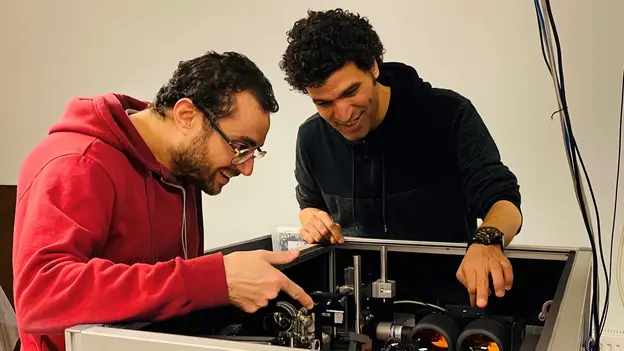Tandem Project
Quantum Materials for Energy Technologies
Laboratory Study
Imagine a computer does not require external power or battery anymore, and could operate with the power harnessed from our body heat when we hold it. Such an invention could completely revolutionize electronics and would lead to unimaginable applications that we cannot even think of today. Quantum materials offer a plethora of functional properties that are essential for such a development of new technological applications. Nevertheless, several key fundamental issues need to be addressed in order to demonstrate the true potential of these new materials. Therefore, understanding the fundamental properties in novel quantum materials and the development of methods to characterize and control their collective behaviour is a research field that attracts enormous interest.
Quantum effects - the magic of quantum materials
This project investigates quantum materials and their exceptional properties that go beyond classical understanding. The main characteristic of these kind of materials are their electrons: they don’t behave as we know from free moving particles, because of certain quantum effects. The exceptional physical properties in quantum materials arise from the electronic interactions at an atomic scale, where quantum phenomena such as interference and fluctuation effects are important. Recent developments include the discovery of novel phenomena resulting from the topology of the electron wave function in solids and the dynamical control of many electron states known as superconductivity.
What are quantum materials good for?
One of the prime examples of the unique state of quantum materials is superconductivity, which involves electrical current that flows without resistance and where electrons pair up and condense in a coherent macroscopic quantum state. The unique properties of superconductors make them perfect candidates for a large range of applications; from energy transmission, medical applications, as well as unique components of future quantum computers. Engineer and AGYA member Dr. Lobna Said explains:
Quantum materials are at the basis of quantum computers. Those are supposed to work in a fundamentally different way than the computer we know. Therefore, they are expected to solve much more complex problems.
Quantum materials in the making
Quantum materials can exhibit unique optical, magnetic, and electronic properties that lead to unprecedented practical functionality. Many quantum materials derive their fascinating properties from reduced dimensionality from 3D to 2D. As electrons behave differently in 2D environments, also the material’s properties vary. The lack of high-quality samples is a significant obstacle to quantum materials development. Before researching these unique properties, the material needs to be produced in the laboratory. In this project, the focus lies on the development of novel approaches to grow high-quality single crystals of quantum materials and to explore new quantum states of matter.
The research of AGYA member Prof. Dr. Mahmoud Abdel-Hafiez focuses on an interdisciplinary direction at the frontier between condensed matter physics and materials science that includes the preparation and characterization of quantum materials. He has a well-renowned expertise in sample synthesis, combined with a unique profile in high-pressure techniques.
The aim of this research is to gain a deeper understanding of the physical and chemical behaviour of such materials with a special focus to improve their physical and chemical properties, their functionality, and their potential for their use in future alternative energy technologies. One of the prime examples of these materials is transition metal trihalides - layered materials composed of CrX3 (X=Cl, Br, and I) with unique layer-dependent magnetic properties. Understanding the long-range magnetic order in these materials is an intriguing subject of widespread research.
The production and characterization of new materials has been the research focus in several recent AGYA projects:
- Disciplines Involved
- Physics, Material Sciences, Chemistry
- Cooperation Partners
- Fayoum University, Egypt
- Hashemite University, Jordan
- Project Title
- Materials for Energy: Quantum Materials for Energy Technologies
- Year
- 2021
- Funding Scheme
- Tandem Project
- Countries Involved
- Germany, Egypt, Jordan, Sweden
- AGYA Publication
- Ultrafast Charge Transfer Dynamics in 2D Covalent Organic Frameworks/Re-Complex Hybrid Photocatalyst


